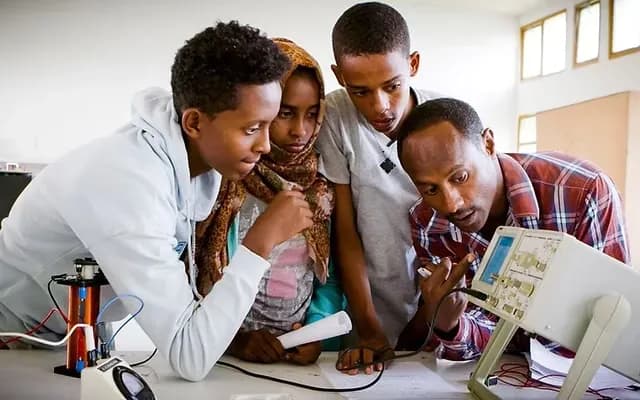Progress for 0 ad
Progress for 1 ad
Progress for 2 ad
Progress for 3 ad


Daniel Metaferiya
Addis Ababa, Ethiopia

Access to quality education remains a formidable challenge across several African countries. The barrier becomes particularly debilitating when it comes to science, technology, engineering, and mathematics fields. Ethiopia is no different as lab equipment ranging from test tubes and beakers to simple measurement instruments is rarely available in most educational institutions.
STEMpower, a Sub-Sahara focused Non-Governmental Organization (NGO) has been working to tackle the challenge by expanding access to affordable education materials for STEM fields across nearly every country in the region. While training, capacity building, and individual support are part of the NGO’s portfolio, its recent achievements in the production of science kits are having a reverberating impact in schools across the capital.
A stone's throw away from the Gurd Shola St Mary Church lies a sprawling compound infrequently visited by a host of familiar faces. The humble exterior hides a buzzing hub of creativity in the form of FAB LAB, STEMpower 65th center equipping students with science kits and laboratory equipment produced locally. Ideally located in the compound of the Education Materials Production and Distribution Enterprise (EEMPDE), the Center is now fitted with 3D printers enabling innovative designs to come to life. Guided by a host of experienced experts from a host of STEM fields in Ethiopia’s leading universities, a passionate team is producing an increasing number of crucial education tools.
“We are producing from locally sourced inputs,” says Simenew Keskes (PhD) STEMpower’s country director.
He refers to the NGO’s decade-long experience in working at over sixty centers to highlight a growing competency that is allowing it to gradually substitute imports.
Last year STEMpower signed an agreement with EEMPDE to kick off a relationship that would have them producing at mass education toolkits for schools.
“We are producing materials that align with the new education curriculum,” Simenew told Shega.
He believes that if more financing was directed directly at builders like themselves greater dividends in quality and quantity could be achieved.
Despite Ethiopia’s adoption of a relatively more stringent education policy over the past few years, student performance in higher education has continued to slide down. Access to textbooks, and basic school supplies remain enduring difficulties while lab equipment for STEM fields is effectively unthinkable for most students.
Israel Gebru, an electromechanical expert at FAB LAB, says most of the equipment is costly and often overlooked by stakeholders. Pointing to one of the Center’s science kits, he explains that nearly 16 tools useable in physics, chemistry, and mathematics could be fitted into it.
“We are using plastic materials and simple electrical devices,” Israel told Shega pointing in pride to the science kit.
He says a new way of structuring the elementary parts has allowed them to develop science kits with multidimensional applicability. The science kits are sold at prices ranging from 65,000 birr while each element could fetch prices starting from 7,000 birr.
“The price drops by nearly half when you assemble it into one fully built kit,” says Israel
Fablab came into being amid the 2020 global COVID-19 pandemic in a bid to help kids grounded by lockdown. It is a part of STEMpower Inc. which works to advance STEM fields across Africa.
👏
😂
❤️
😲
😠

Daniel Metaferiya
Daniel Metaferiya is a writer, journalist and radio host, with a keen interest in technology. He follows developments in Ethiopia's startup ecosystem closely and is passionate about profiling unique MSMEs.
Your Email Address Will Not Be Published. Required Fields Are Marked *